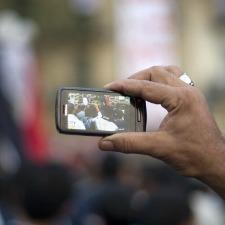BROOKE GLADSTONE:
Live streaming, the act of broadcasting a video to the Internet in close to real time, is quickly becoming a staple tool of 21st century protesters. From Occupy Wall Street to the Egyptian election last week to the Russian election this week, activists use cell phones as weapons of transparency, not only documenting but broadcasting events as they happen.
Bambuser is a live streaming mobile app out of Sweden, with more than two million downloads. Mans Adler is cofounder of Bambuser. He also trains activists in its use. Welcome to On the Media.
MANS ADLER:
Thank you very much.
BROOKE GLADSTONE:
A lot of people think of live streaming as a paragon of objectivity. Is this really the case?
MANS ADLER:
No, but it's definitely much harder to fake. I mean, it has the potential of validating things that a lot of other tools have a hard time of validating. Since Twitter is only text, it's very hard for a news editor to validate if someone writes that there is 100,000 people on Tahrir Square at the moment. However, if they are live streaming, then a news editor will be able to send a real time chat saying, can you broadcast to the right, and they will validate that this is going on right here, right now.
BROOKE GLADSTONE:
You founded Bambuser in 2007. What motivated you then?
MANS ADLER:
The vision was to democratize the technology of broadcasting. The traditional business model for broadcasting video costs several dollars a second. All of a sudden you had everything on your phone; you had a camera, you had an Internet connection. And boom, all of a sudden you can do the same with your mobile phone.
BROOKE GLADSTONE:
How was the technology first applied?
MANS ADLER:
There were soccer moms streaming live from soccer games. There were people handing out real time live lectures. So students away from the university could ask questions and interact. A lot of nonprofit organizations picked up the tool here in Sweden. A lot of the political parties started to do press conferences.
Then it sort of moved over during the last years to more activists. Live streaming provides them the opportunity to not be afraid of losing their content, because in scenarios where you're protesting and the police may confiscate your phones, doing a live stream the content is already out there on the Web.
BROOKE GLADSTONE:
Have you seen any of the live streaming translate into tangible results?
MANS ADLER:
We have several scenarios of this. For example, a guy that we actually met in Egypt, Tarek Shalaby, he was live streaming a protest outside the Israeli Embassy in the beginning of June. He got arrested, together with 12 other people. He kept on streaming while the police were arresting them. He even managed to get his phone into his pocket before they took it away from him.
You can hear everything they say. And they were actually collaborating with the Egyptian Army, which was the first time anybody heard that.
BROOKE GLADSTONE:
In Egypt, there is loyalty towards the army and a great deal of hostility towards the police, so this would seem like a betrayal.
MANS ADLER:
Exactly! And so, this live stream was picked up by Al Jazeera, and it was such a huge thing on the news, even before the police had managed to get those 13 people to the police station. So the head of the police station was afraid of all the media attacking him. He just say, we have to let them go.
BROOKE GLADSTONE:
By the time they got to the station, there was so much media clamor that they were released?
MANS ADLER:
Exactly.
BROOKE GLADSTONE:
Wow, that's fast work. What is the relationship between news outlets and this live streaming?
MANS ADLER:
A lot of news outlets pick up our videos, use it around their websites or even in their traditional broadcasting scenarios. We have deals with all the public broadcasters in Scandinavia and also a couple of the private ones.
When the bomb exploded in Oslo in the 22nd of July this year, there was a person starting a live broadcast, and he - with the bomb they had taken out, and that video was directly picked up by the Danish national broadcaster. So it took four minutes from he started his broadcast until that broadcast was live on the television in the market.
BROOKE GLADSTONE:
Do you have a record of everyone who downloads Bambuser?
MANS ADLER:
Everybody who register an account, we can sort of see, what kind of email address they have used, but that's about it.
BROOKE GLADSTONE:
I wanted to ask you because I wondered whether you're seeing a trend that might predict where the next set of public protests may be occurring.
MANS ADLER:
We're receiving a lot of videos from Russia, Syria, from the Emirates, that many don't know about, and, of course, a lot of Occupy Wall Street movements.
BROOKE GLADSTONE:
So in a way, this live streaming provides a portrait of protest.
MANS ADLER:
Absolutely. It's sort of like taking the temperature on a political level of what's going on, on our planet right here, right now.
BROOKE GLADSTONE:
Mans, thank you very much.
MANS ADLER:
Thank you.
BROOKE GLADSTONE:
Mans Adler is the cofounder of the live streaming video platform Bambuser.
